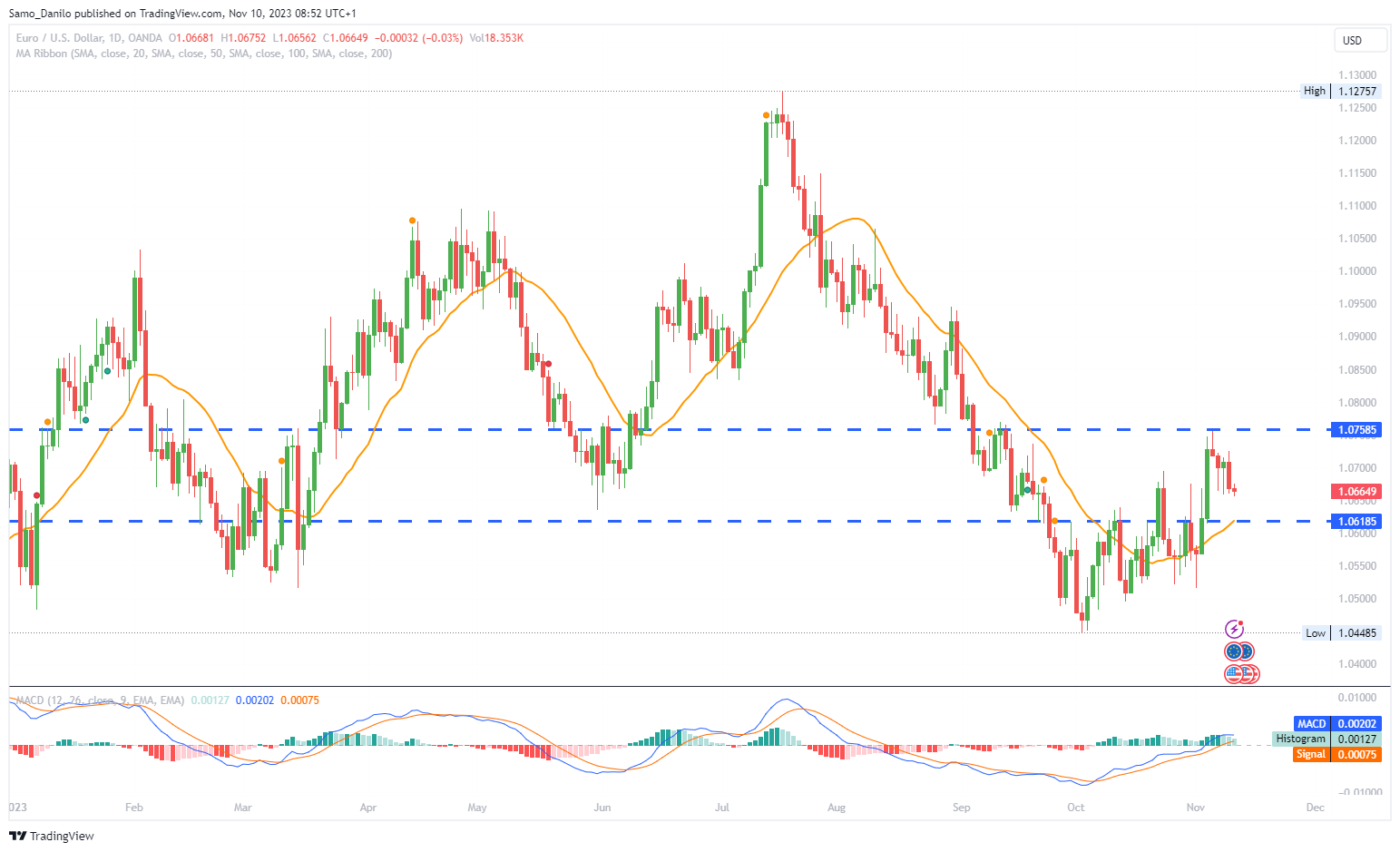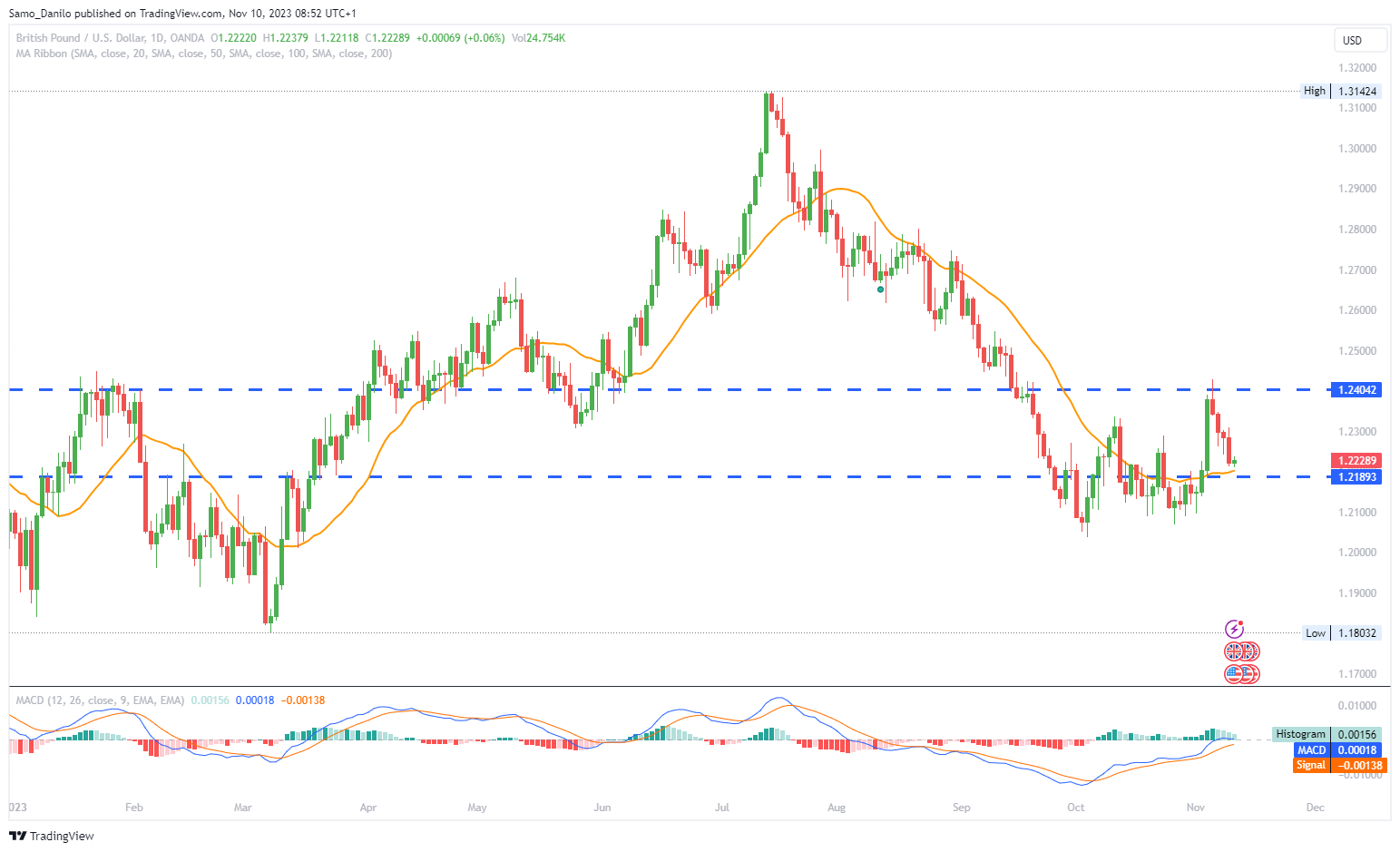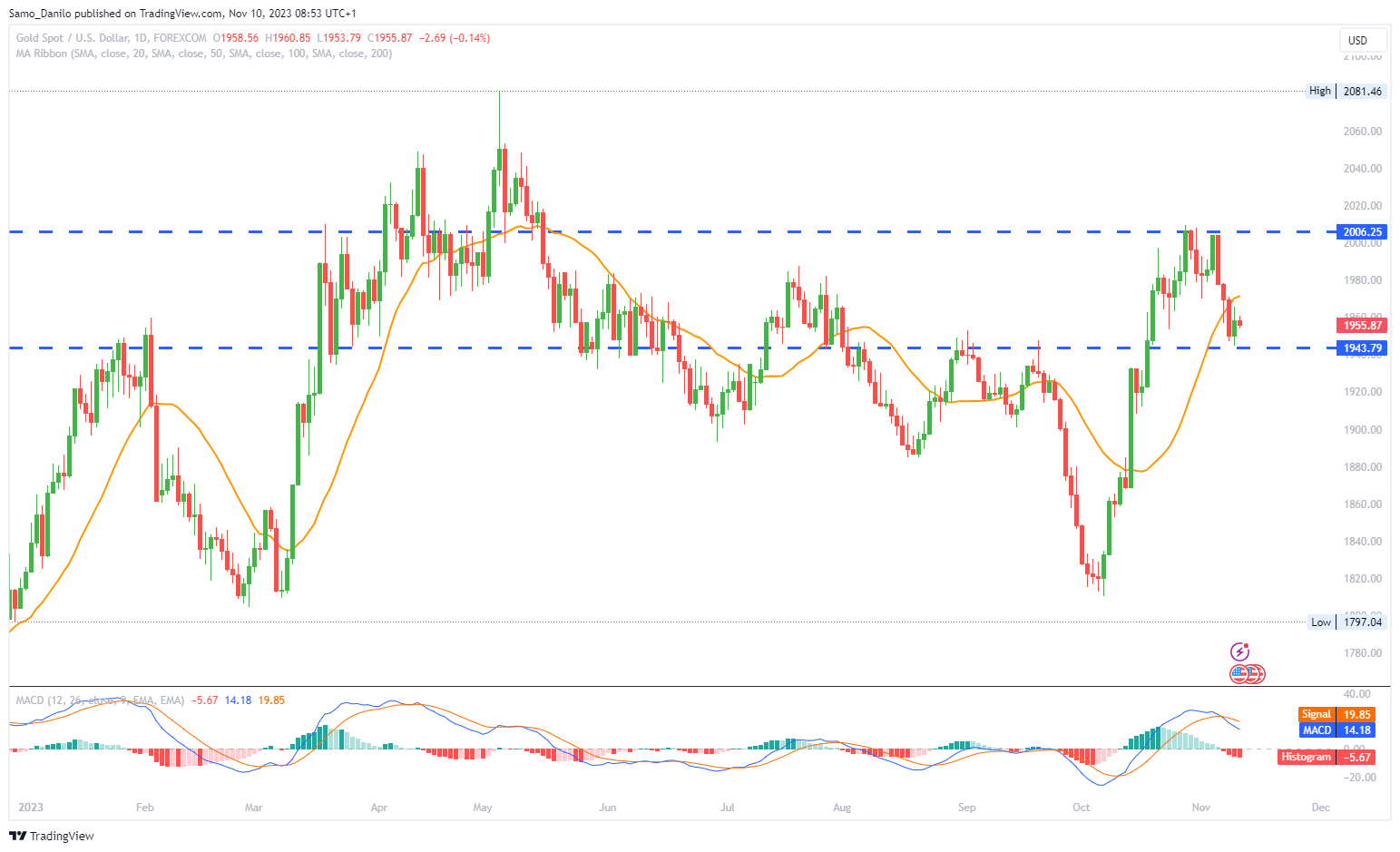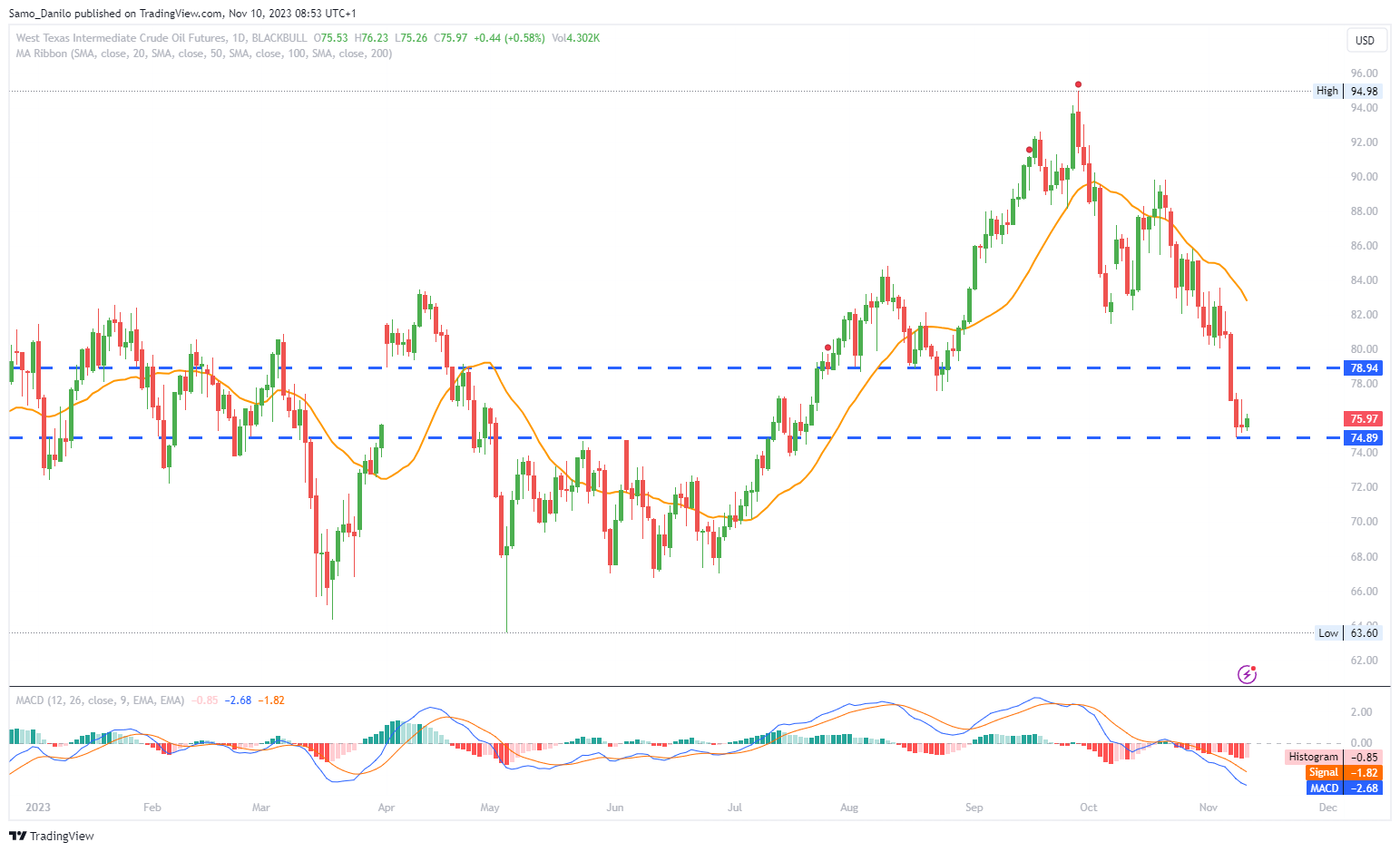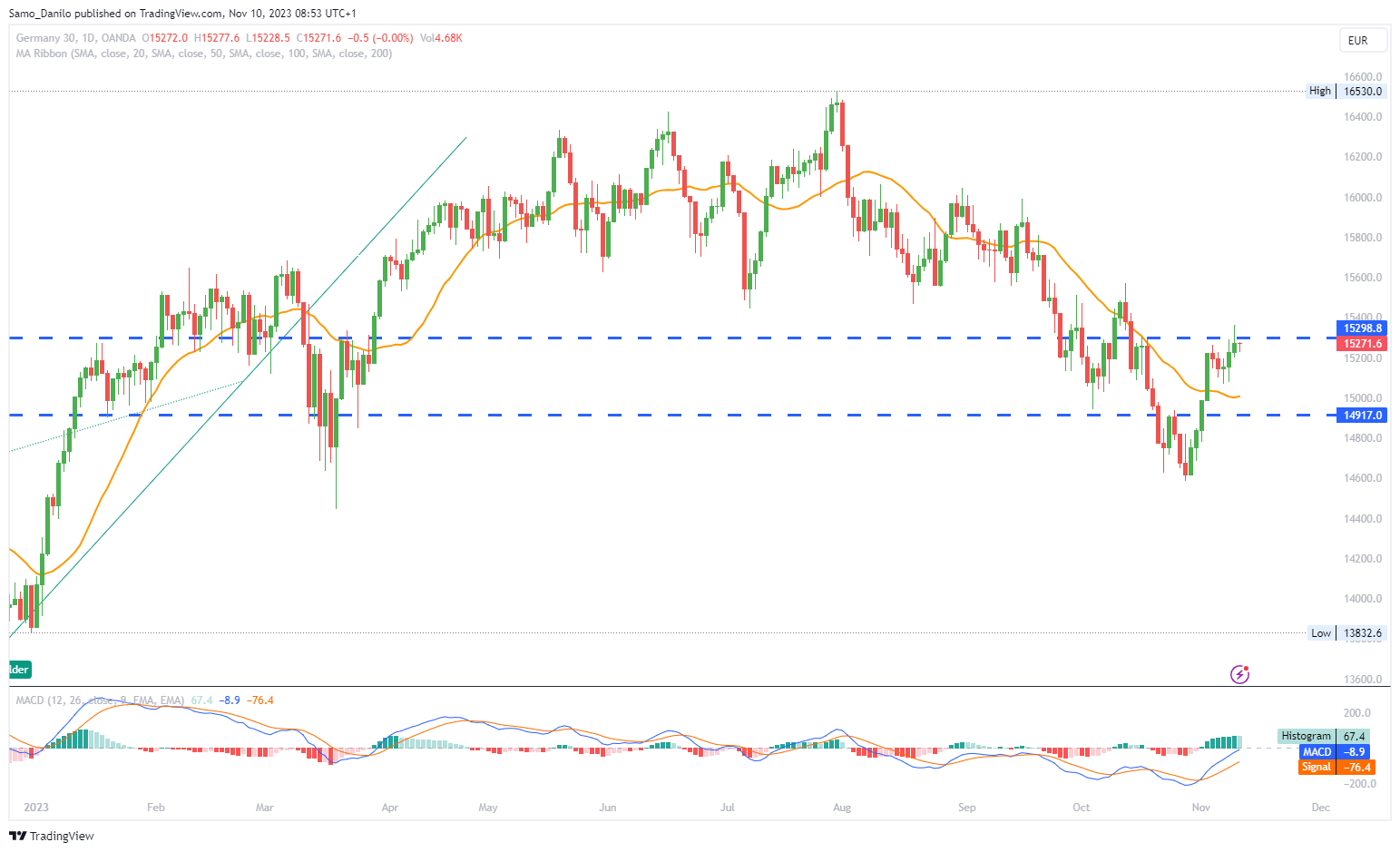EURUSD
- EUR/USD has recovered from recent losses and is trading higher near 1.0670 during the Asian session on Friday. The pair experienced losses in the previous session, partly attributed to hawkish remarks from US Federal Reserve Chair Jerome Powell.
- European Central Bank (ECB) officials have pushed back against some recent dovish market narratives, providing support for the Euro. However, the market anticipates that the ECB will keep rates unchanged, and the focus is on when the first-rate cut may occur.
- The support from ECB officials is considered short-lived, and the fundamental factors favor the US dollar. Powell's remarks on Thursday emphasized the outperformance of the US economy compared to the Euro area's economies.
- While the ECB is currently expected to maintain rates, there is a debate in the market regarding when the first-rate cut might happen. This uncertainty could impact the Euro's performance against the US dollar.
- Powell mentioned that the Federal Open Market Committee (FOMC) is not confident that monetary policy is sufficiently restrictive to bring inflation down to 2% over time. This statement from Powell may have contributed to the recent strength of the US dollar.
Closing statement:In summary, EUR/USD is recovering from recent losses, but the market remains sensitive to statements from central banks, especially considering the ongoing debate about the ECB's future monetary policy actions and the perceived strength of the US economy.
GBPUSD
- The GBP/USD pair is in a bearish consolidation phase on Friday, trading in a narrow range around the 1.2220-1.2225 area. This is just above a one-week low reached during the Asian session.
- Dovish remarks by the Bank of England’s (BoE) Chief Economist Huw Pill earlier in the week have contributed to the weakening of the Pound. The market has been speculating about potential rate cuts in response to these comments.
- The latest data on unemployment claims in the United States shows a deceleration compared to the previous week’s Initial Jobless Claims report. The number of claims came in at 217K, below estimates of 218K. This suggests a certain stability in the US labor market.
- There's a noted division among Federal Reserve policymakers, with most members adopting a more neutral stance. However, the outlook may shift based on next week’s inflation report, which could influence views among the Federal Open Market Committee (FOMC) members.
- The UK's Gross Domestic Product (GDP) expanded at an annual rate of 0.6% in the third quarter, according to the Office for National Statistics (ONS). This growth rate matches the second quarter's performance and exceeds the market expectation of 0.5%.
| SMA (20) | Slightly Rising |
|
| RSI (14) | Slightly Falling |
|
| MACD (12, 26, 9) | Slightly Rising |
|
Closing statement: GBP/USD is experiencing a bearish consolidation, influenced by dovish BoE remarks and ongoing considerations of monetary policy directions. The US labour market stability and the upcoming inflation report will likely be key factors in shaping market sentiment. Additionally, the UK's GDP growth meeting expectations might provide some support to the Pound.
GOLD
- Gold price is facing challenges in capitalizing on the previous day's bounce from the $1,944 area, representing a three-week low. It is currently trading above $1,955 but remains on track for its worst week in over a month.
- Financial markets are characterized by cautious optimism, driven by the belief that central banks might have concluded monetary tightening. This sentiment persists despite policymakers emphasizing the possibility of additional rate hikes.
- Richmond Federal Reserve Bank President Thomas Barkin provided encouraging comments on Thursday, describing the economy as "remarkably" healthy and noting real progress on inflation.
- Atlanta Fed President Raphael Bostic reiterated that the full effects of recent policies are yet to be seen.
- Federal Reserve Chair Powell expressed concerns that the implemented policies might not be restrictive enough to bring inflation down to the target over time. This suggests a nuanced view within the Fed regarding the effectiveness of current measures.
| SMA (20) | Rising |
|
|
| RSI (14) | Falling |
|
|
| MACD (12, 26, 9) | Falling |
|
|
Closing statement: Gold is struggling amid cautious optimism in financial markets and the perception that central banks might be done with tightening. Encouraging remarks from Fed officials, including comments on the health of the economy and progress on inflation, contribute to the complex dynamics influencing gold prices. Additionally, concerns expressed by Fed Chair Powell about the effectiveness of current policies add to the uncertainties surrounding gold's trajectory.
CRUDE OIL
- On the last day of the week, West Texas Intermediate (WTI) Crude Oil prices attracted some buyers, pushing the commodity to the $76.00/barrel mark during the Asian session. Despite the slight rebound, Crude Oil remains well within striking distance of the lowest level since July 21, which was touched earlier in the week. The market appears poised to end the week with significant losses for the third consecutive week.
- Manufacturers in the US, Europe, and China reported worsening business conditions in October. This economic data suggests challenges in these key regions and contributes to concerns over slowing demand. Concerns over slowing demand in the US and China continue to exert downward pressure on Crude Oil prices. This factor is significant given that these two countries are major consumers of oil.
- Traders are pricing in a smaller risk premium related to potential supply disruptions from the Middle East due to the ongoing conflict. This suggests a perception that geopolitical tensions may not pose an imminent threat to oil supplies.
- Signs of increased crude production in both the US and Iran contribute to the notion that oil markets may not be as tight as initially expected. This oversupply dynamic, combined with reduced risk premium, contributes to the negative outlook for Crude Oil prices.
- Despite the negative factors, it's noted that major producers Russia and Saudi Arabia have pledged to maintain their supply cuts until the end of the year. However, this commitment seems to be doing little to provide support to Crude Oil prices, highlighting the prevailing negative sentiment.
| SMA (20) | Falling |
|
|
| RSI (14) | Falling |
|
|
| MACD (12, 26, 9) | Falling |
|
|
Closing statement: The outlook for Crude Oil remains challenging as the commodity struggles to recover from recent lows. Concerns over worsening business conditions in key manufacturing regions, coupled with anxieties about slowing demand in the US and China, are keeping prices under pressure. Despite ongoing geopolitical tensions in the Middle East, traders are less inclined to factor in a significant risk premium for potential supply disruptions. Additionally, signs of increased crude production in the US and Iran, alongside a lack of substantial support from major producers' supply cut pledges, contribute to the prevailing negative sentiment in the Crude Oil market.
DAX
- The ECB Economic Bulletin on Thursday captured the attention of investors. The bulletin emphasized the ECB's commitment to achieving its inflation target and signaled a higher-for-longer interest rate path. This commitment has influenced market sentiment, with investors interpreting it as a sign that the ECB is approaching the end of its tightening cycle. As a result, there has been an increased appetite for riskier assets.
- The market has responded positively to the ECB's commitment to maintaining rates in restrictive territory and remaining data dependent. This has bolstered confidence among investors, contributing to potential gains in the DAX. The perceived dovish stance of the ECB has likely influenced trading dynamics.
- Siemens Energy AG experienced a notable surge of 6.30% following positive news about securing government backing for project guarantees. Merck rallied 3.92%, despite a forecast of a decline in full-year profit. Deutsche Telekom AG gained 0.87%, supported by strong third-quarter results and a positive outlook. Conversely, Rheinmetall AG faced a 0.91% decline, despite providing positive guidance for the 2023 fiscal year.
- The market's attention is now turning to ECB President Christine Lagarde, who is expected to be in the spotlight on Friday. Investors anticipate further insights into the ECB's monetary policy direction. Lagarde's comments following the release of the ECB Economic Bulletin will be closely monitored for confirmation or clarification of the higher-for-longer projection.
- Corporate earnings will remain a key focus for the DAX. The upcoming release of earnings reports, particularly from major players like Allianz, will likely impact market sentiment and contribute to overall DAX movements.
| SMA (20) | Falling |
|
|
| RSI (14) | Slightly Rising |
| |
| MACD (12, 26, 9) | Slightly Rising |
|
Closing statement:In summary, the ECB's recent stance and corporate earnings reports have played pivotal roles in shaping the current dynamics of the DAX. The market is navigating these factors with a keen eye on monetary policy signals and corporate performance.
